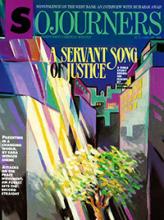IT WAS IN THE SUMMER OF 1980 that a group of us "discovered" Isaiah. It seemed as though we had all accidentally broken the crust of an ancient cave and come upon a treasure in a stone jar, a veritable Dead Sea scroll.
He had of course been there all the time, all our lifetime. But now he was "our" Isaiah.
That summer we were seeking in scripture a metaphor, an image that would lend strength to an as-yet-nascent purpose. Finally it came to us, through Molly Rush, mother and grandmother, of the Thomas Merton Center in Pittsburgh. The text that would turn life on its head: "God will wield authority over the nations and render judgment over many peoples. They will hammer their swords into plowshares, and their spears into sickles."
All great moments are finally simple. We took our small household hammers (and our smaller courage) in hand, and on September 9, 1980, entered the General Electric Reentry Division plant in King of Prussia, Pennsylvania.
Armed, so to speak; disarmed by Isaiah. Preparing for these nefarious goings-on was, I reflected often since, a perfect way of doing scripture study. There we were, willy-nilly, under the nudge of conscience, rueful, dead center. In some place known as the geography of faith, a terrain, icy and torrid by turns, in which Isaiah himself had stood.
He stood there, in his own time, a time uncannily like our own. And then occurred to him this oracle, swords into plowshares! A word highly unlikely, absurd even, given "the facts" (his, ours), "realism," "big-power diplomacy," "just war theory," the curious game known as "interim ethic."
Read the Full Article

